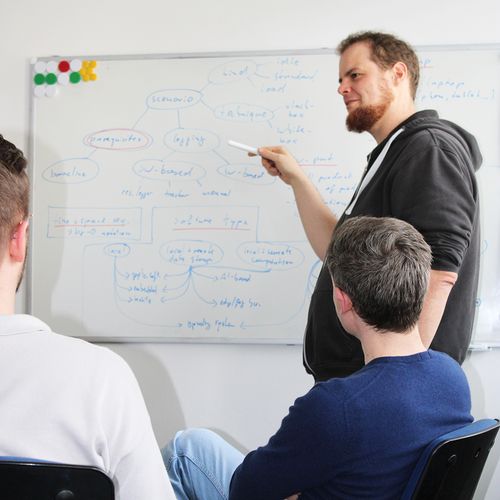I studied computer science at the Umwelt-Campus Birkenfeld and have been working in R&D projects since 2013. My focus is on improving the sustainability of and through ICT and especially software systems. I am doing my PhD in the area of energy and resource efficiency of Machine Learning and Artificial Intelligence. Further research interests are in the area of Data Science and Data Management.

I develop a measurement and analysis methodology for evaluating the environmental impact of software. The energy consumption of the ICT industry is constantly growing and currently causes about 2-3% of global CO2 emissions, which is about 1.0-1.7 billion tons of CO2e. Added to this are the resources required for the production of new hardware (e.g. rare earths). While it is the hardware that causes the environmental impacts, the software controls the hardware and causes the consumptions as a result. AI, as a type of software, has a very high consumption due to the high demands on hardware and necessary data, training times, etc. However, it also contains a large potential for savings in other areas. It is therefore all the more important that AI itself is developed in a resource efficient way.
My work contributes to the development of a measurement and analysis methodology for energy and resourceefficient software, and its transfer to artificial intelligence systems. To this end,I consider factors that influence the consumption of software and especially AI-based systems during their life-cycle. Such influencing factors are, for example, the location (cloud, edge, embedded) where the computational and storage services are provided, the role of actors, application scenarios, configuration of AI systems, used data, its representation and transmission, the design of the software architecture, etc. Based on literature, as well as previous experiments, I select possible factors and create distinct use cases, in which different solution approaches can be used to achieve the same goal. Examples include the use of different programming languages, algorithms, libraries, data structures, protocols, models, hardware and software setups. Once the selection is made, I implement scenarios for use cases, each with the methods to be investigated, and measure the energy and resource consumption during execution. The measurement results are then analyzed with respect to energy consumption and hardware usage and the individual methods, among other things. This allows the selected scenarios to be compared in order to identify the more energy-efficient setup.
Furthermore, I continuously refine the the measurement and evaluation methodology. This is necessary, because software can quickly become very complex, which is especially true for the mostly heterogeneous and distributed AI-based systems. Often, it is necessary to first determine the factors affecting the measurement before the actual experiments in order to make the influencing factors measurable in isolation. Finally, the knowledge gained in the experiments needs to be translated into approaches for predicting and optimizing energy and resource efficiency of the software These approaches will then be implemented in various research projects of the institute. In this way, we would like to provide developers, students, and all other stakeholders involved in the software life-cycle with a model for continuously monitoring, classifying, and optimizing the impact of their software on energy and resource consumption.
The developed models, methods and criteria are first evaluated and validated by the scientific community, disseminated in conferences and workshops. We then gradually transfer the results to society by developing and presenting best practice examples at developer conferences, cooperating with industry or developing labels, such as the "Blue Angel". We hope that in the long term this will lead to a turn in society and, by economies of scale, ultimately to strong resource savings by applying the methods in developing software and especially AI-based systems.

You are leaving the official website of Trier University of Applied Sciences